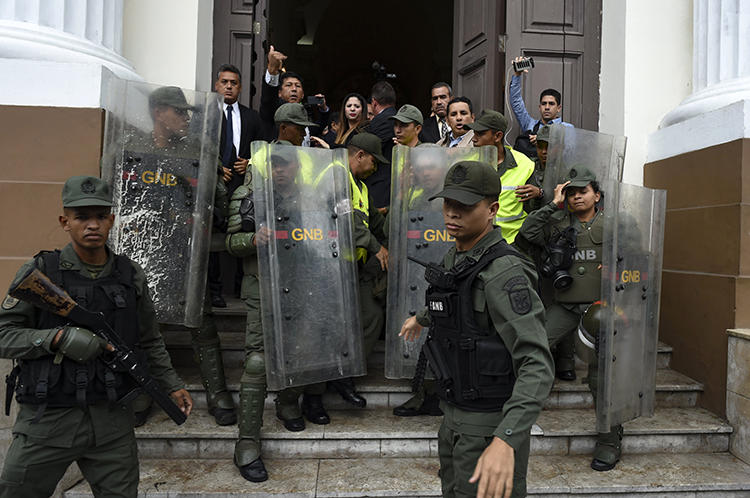Since May 7, 2019, the Venezuelan Bolivarian National Guard has blocked journalists from accessing the National Assembly, the country’s legislature, during the body’s debates and activities held every Tuesday, according to news reports and local rights organizations.
National Guard troops barred local and international media from entering the assembly building on May 7, 14, 21, and 28, and June 4, 11, and 18, all Tuesdays when legislative debates were held, according to reports by local and international media organizations on each of those days.
The blocking began on the first Tuesday after the president of the National Assembly, Juán Guaidó, called for a popular uprising against Venezuelan President Nicolás Maduro, according to reports. The National Assembly is the last government body controlled by the Venezuelan opposition, according to those reports.
The soldiers are following orders issued by National Guard Major General Leonardo César Malaguera Hernández, according to local news website Crónica Uno and Caracas-based daily El Nacional.
On each Tuesday, National Guard officers have surrounded the premises of the assembly, barring journalists from entering the building and insulting and harassing them, as reported by local media. Several local outlets and organizations have also reported that pro-government paramilitary groups have been stationed at the building’s entrance, harassing journalists and threatening to rob them.
On June 4 and 18, journalists pushed through the National Guard barricades and forcibly entered the assembly building with the help of pro-opposition lawmakers, according to Carlos Correa, director of local civil society group Espacio Público, who spoke to CPJ via phone, and as seen in videos posted to Twitter by the Press Workers National Union, a press workers’ organization.
Coverage of the National Assembly has been further obstructed since May by the selective blocking of video streaming and web search services by state telecom provider CANTV during the exact times of the Tuesday debate sessions, according to posts on Twitter by digital rights groups Netblocks and VE Sin Filtro.
CPJ’s repeated phone calls to the Bolivarian National Guard’s phone number posted on its official website where met with a recorded message saying “your call cannot be processed.”
